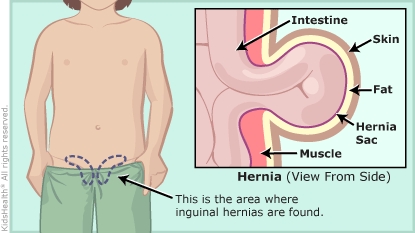Inguinal Hernia: How to Care for Your Child
An inguinal hernia happens when part of the intestines slips into the groin (where the belly meets the upper leg) instead of staying in the belly as it should, causing a bulge or lump. Inguinal hernias need to be fixed with surgery before they cause more serious problems.


-
Follow up with the surgeon as instructed.
-
Go to all medical visits and get any tests your care team recommends before the surgery.
-
Your child should not lift anything heavy before the surgery. Follow the care team's instructions on what your child can or can't do before the surgery.
-
Your child can eat a normal, healthy diet until the day before the surgery.
-
The care team will give you more information about what and when your child can eat and drink the day before the surgery. It's very important to follow instructions exactly so your child's surgery isn't delayed or canceled.
-
If your child takes medicines, call the care team to find out if any of them should be stopped before the surgery.

-
You have questions about the surgery.
-
Your child develops a fever above 100.4°F (38°C).
-
Your child feels sick or is throwing up.
-
Your child is not pooping as usual.
-
Your child does not want to eat.
-
Your child is cranky or very fussy and can't be calmed down.

Your child:
-
develops pain in the belly or groin
-
has swelling or a bulge in the groin, belly, or scrotum that:
-
doesn't go away when your child lies down and relaxes
-
looks dark, red, or purple
-
feels hard

How do kids get an inguinal hernia? There are different types of inguinal hernias. A common type in babies and young kids happens when the intestines slide into a pathway called the inguinal canal in the groin area rather than staying in the belly.
When a baby boy develops in the womb, the testicles travel from the belly to the scrotum through the inguinal canals. These pathways should close before birth. If one stays open, a boy's intestines can slip into the inguinal canal and into the scrotum, forming a hernia. Even though girls don't have testicles, they do have inguinal canals and can have inguinal hernias.
Why does the hernia get bigger and smaller? When your child does things that create pressure in the belly (like standing up, crying, coughing, or straining to poop), the hernia will get bigger. The hernia should get smaller again when your child lies down and is calm. If it doesn't, take your child to the ER right away to get checked.
What can happen if the inguinal hernia is not fixed? If the hernia isn't fixed, part of the intestine can get stuck and may not get enough blood. The intestine might become damaged. That's why doctors operate on a hernia to close the opening before it becomes an emergency.
How do doctors fix an inguinal hernia? Your child will get medicine (anesthesia) during surgery that blocks pain and helps your child sleep. The surgeon will put the part of the intestine that's inside the hernia back where it belongs, then close the opening to help prevent another hernia.